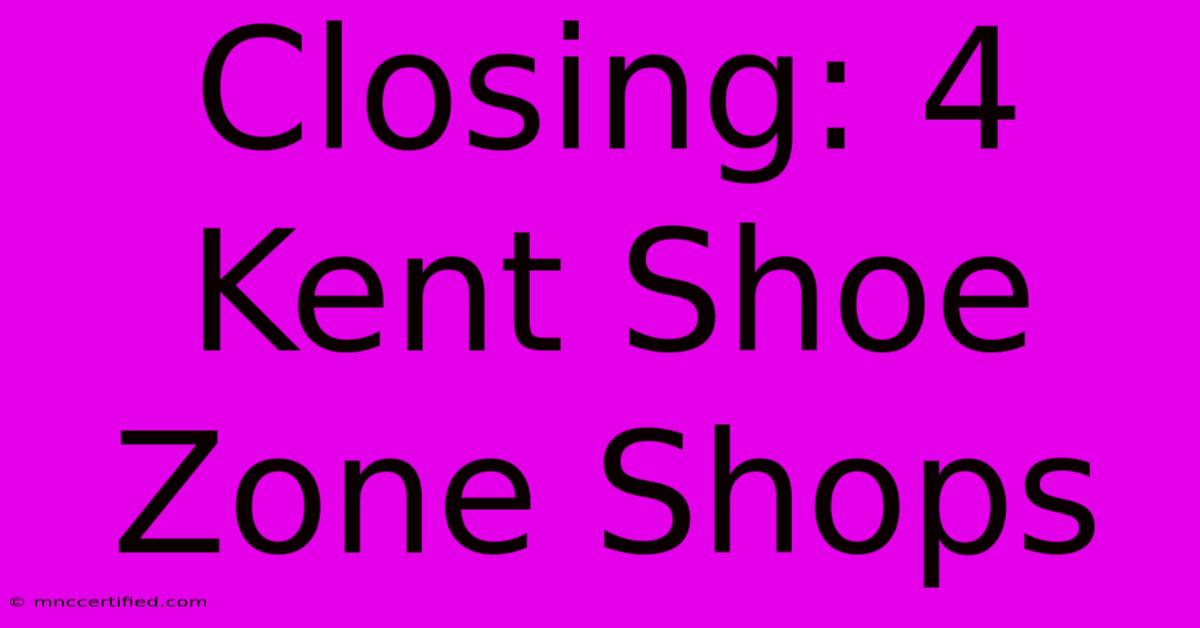Closing: 4 Kent Shoe Zone Shops

Table of Contents
Closing: 4 Kent Shoe Zone Shops - Impact and Implications
The recent announcement of four Shoe Zone shop closures in Kent has sent ripples through the local community and sparked conversations about the changing retail landscape. This article delves into the details of the closures, explores the potential reasons behind them, and examines the broader implications for both consumers and the local economy.
Which Kent Shoe Zone Shops are Closing?
While the exact locations haven't been publicly released by Shoe Zone in a press release, local news reports and social media indicate four Kent stores are affected. Pinpointing the precise addresses requires further investigation using local news archives and social media searches focused on Kent Shoe Zone closures. Once these details become publicly available, updating this article with specific locations will be a priority.
Reasons Behind the Closures: A Multifaceted Issue
Several factors likely contributed to the decision to close these Kent branches. Let's examine the most probable causes:
1. Rising Operational Costs:
Inflation and increased energy prices are significantly impacting businesses across all sectors. Shoe Zone, like many retailers, is likely facing pressure to maintain profitability amidst these rising operational costs. This necessitates difficult decisions, such as store closures, to streamline operations and reduce overhead expenses.
2. Changing Consumer Behavior:
The shift towards online shopping is undeniable. Consumers are increasingly purchasing footwear and other goods online, driven by convenience and often, lower prices. This change in consumer behavior has significantly impacted brick-and-mortar retailers, including Shoe Zone, forcing them to adapt their business models.
3. Competition in the Footwear Market:
The footwear market is highly competitive, with both established brands and new entrants vying for market share. Shoe Zone faces pressure from both high-street competitors and online retailers offering a wider selection and potentially lower prices. This intense competition can make it difficult for some stores to remain viable.
4. Lease Agreements and Property Values:
The terms of lease agreements and the changing property values in certain locations can influence a retailer's decision to close a store. Unfavorable lease terms or escalating rent costs may make it economically unsustainable to continue operating in a particular location.
Impact on the Local Community: Job Losses and Reduced Access
The closure of four Shoe Zone shops in Kent will undoubtedly have a negative impact on the local community. The most immediate consequence is the loss of jobs, affecting employees at those stores. Beyond the direct job losses, the closures could also reduce access to affordable footwear for some residents, particularly those relying on local shops.
Future Outlook for Shoe Zone in Kent: Adapting to Survive
Shoe Zone's strategic response to these challenges will be critical to its future success in Kent. To remain competitive, the company may need to focus on:
- Enhancing its online presence: Improving the online shopping experience and expanding its online product offerings will be crucial.
- Optimizing its store network: Focusing resources on profitable stores and adapting to changing consumer behavior are key.
- Strengthening its brand image: Investing in marketing and branding to differentiate itself from competitors.
Conclusion: Navigating the Changing Retail Landscape
The closure of four Shoe Zone shops in Kent highlights the complexities facing retailers in today's dynamic market. While these closures are undoubtedly concerning, they also underscore the need for adaptation and innovation to thrive in a rapidly evolving retail landscape. The long-term implications for the Kent economy and consumers will require further observation. Staying informed about Shoe Zone's official announcements and local news will be key to understanding the evolving situation.

Thank you for visiting our website wich cover about Closing: 4 Kent Shoe Zone Shops. We hope the information provided has been useful to you. Feel free to contact us if you have any questions or need further assistance. See you next time and dont miss to bookmark.
Featured Posts
-
The Simpsons Channel 4 Departure 2024
Dec 19, 2024
-
Lillards New Adidas Lifetime Contract
Dec 19, 2024
-
Match Report Arsenal 3 2 Crystal Palace
Dec 19, 2024
-
Inflation Risk Us Interest Rate Drop
Dec 19, 2024
-
Rachel Reeves Budget Shoe Zones Response
Dec 19, 2024